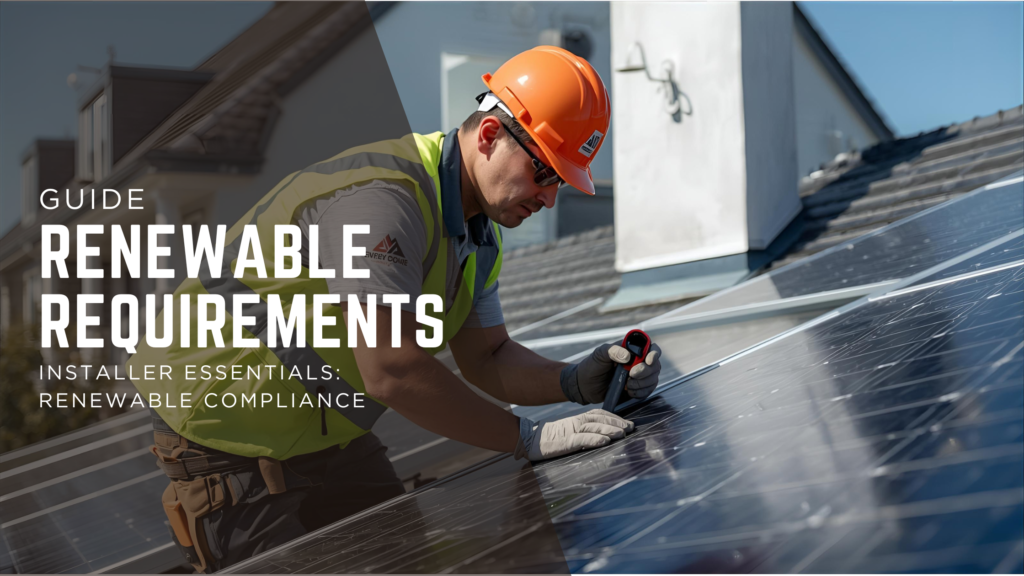Every renewable job looks complete when panels are up or heat pumps are working. But the real mark of professionalism is what you leave behind — a guarantee homeowners can fall back on, even if the installer isn’t around.
That’s what an Insurance Backed Guarantee does.
What is an Insurance Backed Guarantee (IBG)?
Let’s start with the definition:
An Insurance Backed Guarantee underwrites the installing contractors company guarantee in the unlikely event that they cease trading, as defined in the policy’s terms and conditions. It ensures that, should the installing contractor no longer be able to honour the guarantee as per the T&Cs, the insurer steps in to fulfil valid claims under the original insurance backed guarantee terms.
What about Cover Periods?
Insurance backed guarantees typically range from 2 to 10 years. This depends on the trade and technology.
For some measures or technologies, it’s possible to get longer coverage. This depends on the provider, installer accreditation, and the specifics of the policy.
Why IBGs matter in the renewable sector
Compliance via Consumer Codes – While MCS itself doesn’t mandate IBGs directly, membership of consumer codes (e.g. RECC, HIES) does require it. Being part of those codes is a requirement for MCS-certified work.
Sales & Trust – Homeowners want confidence that there’s protection in place for the long run. An IBG is a strong selling point.
Professional standard – Demonstrates that you follow industry best practices. Being able to show that you comply with the standards expected by consumer codes helps your reputation.
Peace of mind – For both you and the customer, an Insurance Backed Guarantee gives assurance that workmanship warranty obligations are backed, especially over longer periods.
IBG requirements under MCS and Consumer Codes
This was mentioned in the first point in “Why IBGs matter in the renewable sector”, so let’s go into a bit more detail:
MCS requires that installers are members of a Consumer Code.
There are currently two Consumer Codes operating in the renewable sector:
These codes set clear standards for protection. Members must insure any deposits they take, as well as the workmanship warranties they issue, so that customers remain protected if the installer ceases trading.
This protection is usually provided through an Insurance Backed Guarantee (IBG). By offering deposit cover and an insured workmanship warranty, installers give homeowners the confidence that their investment is secure and that the right consumer protection is in place.
Insurance Backed Guarantees in Funded vs Able-to-Pay work
Funded work
Funded work consists of installations supported through government or energy company schemes, such as ECO4, the Boiler Upgrade Scheme (BUS), Home Energy Scotland, or the Affordable Warmth Scheme in Northern Ireland. These programmes help households by covering part — or sometimes all — of the installation cost.
Because public money is involved, funded jobs come with strict requirements around installer standards and consumer protection. Membership of TrustMark or a consumer code (and therefore providing IBGs) is often essential to take part.
Being able to show that your jobs are backed by an IBG can be the difference between qualifying and missing out.
Able-to-pay work
Able-to-pay work is funded entirely by the homeowner, without grant or scheme support. Insurance Backed Guarantees aren’t a formal requirement here — but they can still make a big difference.
An Insurance Backed Guarantee reduces perceived risk, builds trust, and shows that you take long-term protection seriously.
Many homeowners will pay more for an installation that offers reassurance, which can help you win work even against lower quotes.
What to look for in an IBG provider
Here’s the checklist every installer should use:
- Flexible cover periods – options that suit different the technology your installing, and the requirements around it.
- Meets consumer code requirements – essential for RECC, HIES, and MCS-linked compliance.
- FCA-regulated – only FCA-authorised firms can issue IBGs legally.
- Clear documentation – policies that are transparent and easy for homeowners to understand.
- A strong history of providing IBGs – trusted brands and strong underwriters give reassurance.
- Added support beyond the guarantee – review platforms, marketing tools, and account manager support add real value for your business.
IBG providers in the renewable sector
As we’ve covered above, Insurance Backed Guarantees in the renewable sector are closely tied to the consumer codes that MCS installers must join.
The two main codes — RECC and HIES — both require members to provide IBGs as part of their consumer protection obligations.
RECC – The Renewable Energy Consumer Code requires members to insure deposits and workmanship warranties, typically through an Insurance Backed Guarantee from one of its approved FCA-regulated providers. This ensures that customers are protected if the installer ceases trading. The full list of approved IBG providers is available on the RECC website.
HIES – The Home Insulation & Energy Systems Quality Assured Contractors Scheme includes deposit protection and IBGs as part of membership. Once an installer joins, HIES manages these protections for their domestic jobs, giving homeowners confidence that cover is in place.
While some companies issue their own company guarantees, only IBGs underwritten by an approved insurer will satisfy consumer code requirements and provide valid protection to customers.
Why HomePro?
Choosing an IBG provider isn’t just about meeting consumer code requirements. The right partner can also make your business stronger.
With HomePro, you get:
- Trusted protection – FCA-regulated and backed by established insurers.
- Recognised approvals – MCS-approved, RECC-approved, and FlexiOrg-approved.
- Independent reviews – every IBG is used to gather verified homeowner feedback, helping you turn customer satisfaction into visible proof of quality.
- Dedicated support – a named account manager who understands your business and is there when you need advice.
- Marketing tools – from printed stationery and branded certificates to online assets that build trust and credibility with homeowners.
An IBG should protect your customers — but with HomePro, it also helps you stand out, win more jobs, and grow your business.
Interested in finding out more? Fill in the quick application form, and one of our team will be in touch.
Turning Protection Into Opportunity
Insurance Backed Guarantees aren’t just paperwork — they’re proof. Proof that your jobs meet the standards schemes expect, that your customers are protected, and that you’re building a business with trust at its core.
With the right provider, IBGs also give you tools to grow — reviews, marketing support, and a dedicated account manager in your corner.
So don’t see them as another compliance hurdle. See them as the edge that helps you win the next job.
👉 Ready to get started? Complete our short application form, and we’ll be in touch to help you put IBGs to work in your business.
Disclaimer:
The information on this page is provided for general guidance only. Laws, regulations, and scheme requirements may change over time. We make no guarantee that all the content here is current, complete, or accurate, and we accept no liability for decisions made based on it. It is your responsibility to verify any details with official sources or qualified professionals before acting on them.


